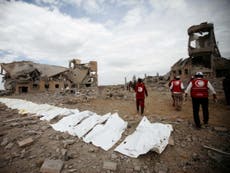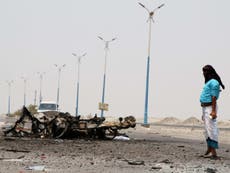EPA suspends enforcement of environmental laws amid coronavirus
IT'S BECOME THE ENVIRONMENTAL POLLUTION AGENCY UNDER TRUMP
BY REBECCA BEITSCH THE HILL - 03/26/20
The Environmental Protection Agency (EPA) issued a sweeping suspension of its enforcement of environmental laws Thursday, telling companies they would not need to meet environmental standards during the coronavirus outbreak.
The temporary policy, for which the EPA has set no end date, would allow any number of industries to skirt environmental laws, with the agency saying it will not “seek penalties for noncompliance with routine monitoring and reporting obligations.”
Cynthia Giles, who headed the EPA’s Office of Enforcement during the Obama administration, called it a moratorium on enforcing the nation's environmental laws and an abdication of the agency's duty.
“This EPA statement is essentially a nationwide waiver of environmental rules for the indefinite future. It tells companies across the country that they will not face enforcement even if they emit unlawful air and water pollution in violation of environmental laws, so long as they claim that those failures are in some way 'caused' by the virus pandemic. And it allows them an out on monitoring too, so we may never know how bad the violating pollution was,” she wrote in a statement to The Hill.
The EPA has been under pressure from a number of industries, including the oil industry, to suspend enforcement of a number of environmental regulations due to the pandemic.
“EPA is committed to protecting human health and the environment, but recognizes challenges resulting from efforts to protect workers and the public from COVID-19 may directly impact the ability of regulated facilities to meet all federal regulatory requirements,” EPA Administrator Andrew Wheeler said in a statement.
In a 10-page letter to the EPA earlier this week, the American Petroleum Institute (API) asked for a suspension of rules that require repairing leaky equipment as well as monitoring to make sure pollution doesn’t seep into nearby water.
Other industries had also asked to ignite the “force majeure” clauses of any legal settlements they had signed with the EPA, allowing for an extension on deadlines to meet various environmental goals in the face of unforeseen circumstances.
But Giles and others say the memo signed Thursday goes beyond that request, giving industries board authority to pollute with little oversight from the agency.
“Incredibly, the EPA statement does not even reserve EPA's right to act in the event of an imminent threat to public health,” Giles said.
“Instead, EPA says it will defer to states, and ‘work with the facility’ to minimize or prevent the threat. EPA should never relinquish its right and its obligation to act immediately and decisively when there is threat to public health, no matter what the reason is. I am not aware of any instance when EPA ever relinquished this fundamental authority as it does in this memo.”
The memo says companies should try to minimize “the effects and duration of any noncompliance” with environmental laws and should also keep records of their own noncompliance, along with identifying how the coronavirus was a factor.
The EPA on Friday pushed back against characterization of the memo as a waiver of environmental rules.
"During this extraordinary time, EPA believes that it is more important for facilities to ensure that their pollution control equipment remains up and running and the facilities are operating safely, than to carry out routine sampling and reporting," agency spokeswoman Andrea Woods told The Hill by email.
"If a facility has exceedances of limits on pollution the policy does not offer any no action assurance. We retain all our authorities and will exercise them appropriately. It is a temporary policy and will be terminated when this crisis is past.”
Critics say it's not unreasonable to refrain from environmental enforcement on a case-by-case basis when companies are unable to comply with the letter of the law, but many were alarmed by the breadth of Thursdays memo.
“It is not clear why refineries, chemical plants, and other facilities that continue to operate and keep their employees on the production line will no longer have the staff or time they need to comply with environmental laws,” Eric Schaeffer, a former director of civil enforcement at the EPA who is now with the Environmental Integrity Project, wrote in a letter signed by a number of environmental groups in anticipation of the memo.
The letter writers also criticized the requests from the API, arguing nearby communities would face prolonged exposure to a number of air and water pollutants that might be expelled through oil production — something they say would have “a very specific impact on public health and safety.”
The diminished compliance requirements for industry comes at a time when the EPA has refused to budge on deadlines for comments as they proceed with a number of deregulatory actions.
Environmental and public health groups had argued that those with science and health backgrounds who would normally weigh in on such regulations have been pulled into the coronavirus fight, leaving them unable to divert their attention.
“The Environmental Protection Agency has not shown the same concern for the impact the coronavirus has had on the ability of community and public interest groups to respond to various proposals to weaken environmental standards,” Schaeffer wrote in the letter.
But the EPA has argued exceptions were not needed.
“We’re open and continuing our regulatory work business as usual,” an EPA spokesperson told The Hill in a statement. “As regulations.gov is fully functioning, there is no barrier to the public providing comment during the established periods.”
Updated at 9:44 a.m. Friday. 3/27/2020














